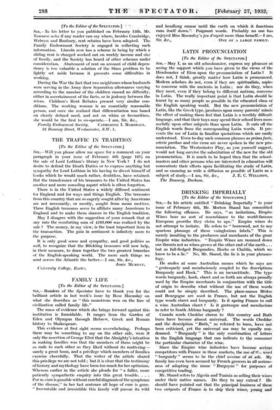LATIN PRONUNCIATION
[To the Editor of the SPECTATOR]
Sia,—May I, as an old schoolmaster, express my pleasure-at seeing the support which you have given to the views of the Headmaster of Eton upon the pronunciation of Latin ? It does not, I think, greatly matter how Latin is pronounced. Modern scholars do not, even if they are spiritualists, aspire to converse with the ancients in Latin ; nor do they,, when they meet, even if they belong to different nations, converse in Latin. The really important point is that Latin should be learnt by as many people as possible in the educated class of the English speaking world. But the new pronunciation of Latin, like the Greek type, produces upon many parents' minds the effect of making them feel that Latin is a terribly difficult language, and that their boys may spend their school lives more usefully upon other subjects than upon Latin. It cuts off the English words froM the corresponding Latin words. It pre- vents the use of Latin in familiar quotations which are easily understood. Even to-day such common phrases as prima facie, ceteris paribus and vice versa are never spoken in the new pro- nunciation. The Westminster Play, as you yourself suggest, would not long survive the substitution of the new for the old pronunciation. It is much to be hoped then that the school- masters and other persons who are interested in education will concentrate their efforts upon facilitating the study of Latin, and so ensuring as wide a diffusion as possible of Latin as a
subject of study.—I am, Sir, &c., J. E. C. Wizi..tnox. The Deanery, Durham.


































 Previous page
Previous page